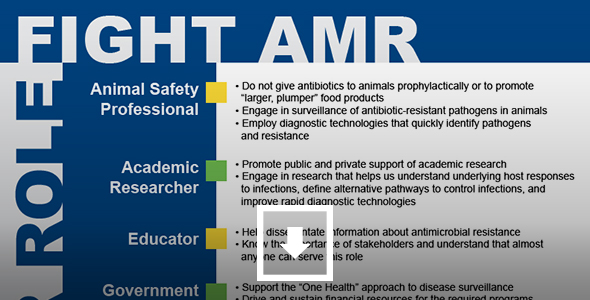By the bioMérieux Connection Editors
Understanding your role in detecting, reducing and preventing the development of antimicrobial resistance (AMR) is key to combating this growing threat. Once we realize how our actions can impact AMR, we can then take appropriate actions to stop and reduce its development and spread. Acknowledging that certain current clinical, industrial, agricultural and veterinary practices may directly or indirectly lead to AMR is key to resolving the problem. The proper stewardship of our vital drugs is indisputably the most immediate way AMR—and the high financial cost of AMR—can be curtailed and ultimately reduced. The key to curbing resistance is to ensure that every patient receives the right antibiotic at the right time at the right dose for the right duration.
No single role within the public health continuum can solve the monumental problem of antimicrobial resistance. To have a positive and lasting impact, everyone must work in concert to curb the overuse and misuse of antimicrobial agents.
When varied groups work together, we can reduce AMR, and the results can be truly remarkable. Hospitals with coordinated and fully integrated antimicrobial stewardship programs, for example, have achieved amazing reductions in AMR. These programs have not only resulted in improved antimicrobial use but have demonstrated decreased overall spending on antibiotics by hundreds of thousands of dollars.
Identify Your Role: Download the Poster
So Why Do You Matter? How Can You Specifically Contribute?

Animal Safety Professionals
- Sub-therapeutic doses of antibiotics should not be given to animals prophylactically.
- Antibiotics should not be used in animal feed to promote “larger, plumper” food products.
- Animal health professionals also play a key role in the surveillance of antibiotic-resistant zoonotic and animal pathogens.
- They must be engaged in employing the newest diagnostic technologies that identify these pathogens and AMR quickly.
Academic Researchers
- Continued public and private support of academic research is essential for the discovery and development of new antimicrobial agents.
- Research helps us understand the underlying host responses to infections, define alternative pathways to control infections, and improve rapid diagnostic technologies.
Educators
- Critical to combating AMR is a global understanding of the magnitude of the problem and dissemination of information.
- Everyone needs to be educated, and everyone in turn can be an educator.
- Clinical care providers, laboratorians, public health administrators, government officials, advocacy groups, teachers and even members of the public can all serve this role.
Government Officials
- Support the “One-Health” approach to disease surveillance.
- The goal of the “One Health” approach is to improve detection and control of antimicrobial resistance by integrating data from multiple monitoring networks.
- Legislators and policy makers must continue in their efforts to drive this national program and sustain financial resources essential for the required programs.
Healthcare Administrators
- Administrators make decisions that are at the forefront of the battle against AMR.
- There is a growing body of evidence that investment in antimicrobial stewardship, advanced diagnostics, information technology and staff training can dramatically reduce AMR.
- Administrators have the power to make the decisions to implement programs and provide funding to support initiatives that can aid in combating antimicrobial resistance.
Pharmaceutical Researchers
- In recent years, the number of new antimicrobials available on the market has declined significantly, leaving clinicians with fewer options to treat patients with resistant infections.
- If new medications are not developed and the spread of resistance is not contained, our communities could face the possibility of truly untreatable infections.
Clinical Pharmacists
- The pharmacist is the bridge between the clinician and the patient in ensuring that the most appropriate antimicrobial is used at the most optimal dosage.
- The pharmacist should be an essential member of every antimicrobial stewardship team.
- They should interact with the clinical team, not only for the selection of initial therapies, but also for developing therapeutic strategies that are appropriate, cost effective, and reduce the risk of AMR.
Laboratory Professionals
- The laboratory must quickly share information with appropriate caregivers to limit overuse or misuse of antimicrobials to the briefest possible time interval.
- They should provide yearly antibiograms that report resistance rates within their institutions and individual units.
- Laboratorians must work to prevent delays in reporting antibiotic resistance and potential outbreaks that could result in the spread or emergence of resistant pathogens.
- Laboratory professionals must adapt quickly to the challenges of new pathogens, increased resistance rates, and novel resistance mechanisms, by providing accurate antimicrobial susceptibility testing.
Diagnostics and Medical Device Professionals
- It is imperative that diagnostic and medical device professionals continue to invest in and develop technologies that quickly identify pathogens and AMR.
- Diagnostic and medical device professionals should educate their customers about the advances in microbial identification and demonstrate how those advances help reduce mortality while preserving financial resources.
Healthcare Providers
- Essential action items include the prompt initiation of infection control practices, when indicated, and the judicious use of antibiotics.
- Clinicians should also commit to prescribing the narrowest spectrum antibiotic that is consistent with good medical practice.
- Antimicrobial stewardship programs are helpful, especially when clinical decision teams consist of treating physicians, pharmacists, clinical care staff, and microbiologists.
- The rapid exchange of information relating to test results (pathogens, antimicrobial susceptibility data) can have a profound impact on patient management.
Patients
- A survey by the CDC and Pew Health Group revealed that nearly 40% of Americans believed antibiotics could treat viral infections, which is incorrect.
- Requesting antibiotics from the doctor for colds, the flu, and other viral infections will not help fight those infections, but it can potentially cause resistant infections to develop.
- It is important that patients advocate for themselves, but they must do so intelligently. Patients should not insist on antibiotics if the doctor says they will not help.
- When prescribed antibiotics, patients should take the complete course. Additionally, patients should never share their antibiotics with others or take antibiotics prescribed for someone else.
We’re All in This Together
Everyone plays a role in the fight against antimicrobial resistance. Understanding your role and how you, specifically, can contribute in the fight against antimicrobial resistance is the first step in combating it. If you don’t fit within any of the above roles, define yours. Understand what it is you can do to help combat AMR. Every role matters, and together we can make a difference.



